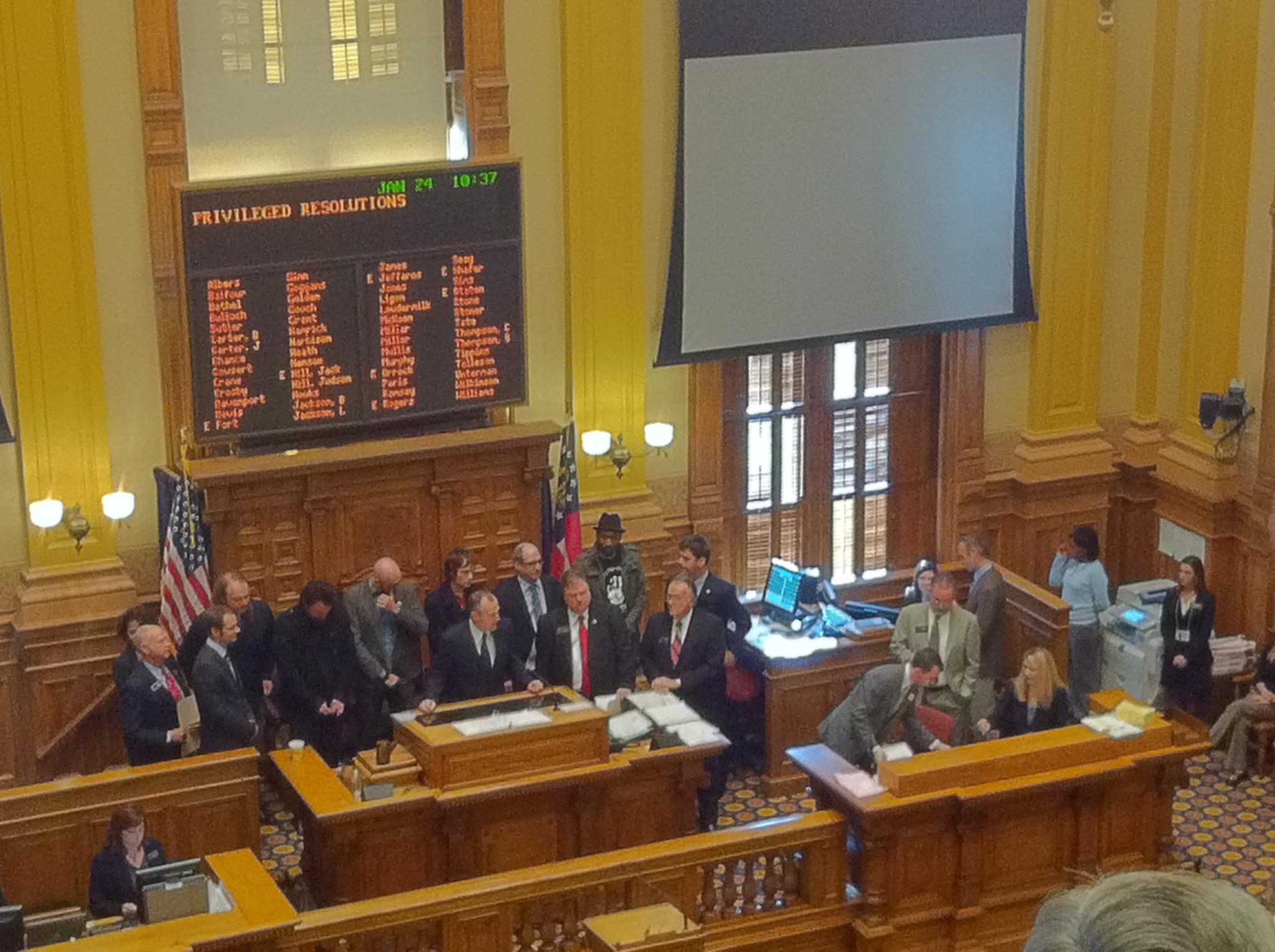The Georgia General Assembly concluded its 154th session on March 30th. Fifty-six members of the Senate and 180 members of the House of Representatives convened. My colleagues in the entertainment industries and I tracked four bills (H.B.) before the legislature: 155, 196, 199, and 277. Of these, only three “crossed over” to the Senate before Sine Dei, the last day of session. Although it did not progress, H.B. 277 identified “sound recordings” as an industry eligible for a tax credit in “less developed [Georgia] areas.” H.B. 196 provided a tax exemption for royalties paid to musical artists, which language was cut from the final bill.

Above: Sine Dei, also known as the last day of the session, when we tore up every last sheet of paper and cast them into the air at the stroke of midnight. From my time as a legislative aide for the Georgia Senate in 2012. Many good memories on the Senate floor and great experience being part of the legislative process.
Though H.B. 196 did not make it into the final bill, H.B. 155 and 199 passed the Senate; Governor Deal received them last Friday and must now sign them into law before July 1st. Tax credits incentivize investment through job creation. This is why understanding these bills and how they can help you generate MORE work and create MORE jobs is essential to their success. My job in this article will be to explain the dynamics of these bills in a way that you can take advantage of each as it aligns with your growth objectives, so that you can prepare for what I perceive will be revered as a Golden Age in Georgia Entertainment, beginning January 1, 2018.
The Georgia Musical Investment Act
The Georgia Musical Investment Act, H.B. 155, will create thousands of jobs for persons and companies in live productions, recording, and scoring, according to advocacy group, Georgia Music Partners. The minimum spend, meaning, the amount of money an entity must spend to qualify for the 15-20% tax credit on income tax over one calendar year, is $500,000 for live productions, $250,000 for recorded musical performances, synched (i.e., scored) for film, television, or interactive entertainment (i.e., video game) productions, and $100,000 for “any other” recorded musical performance (e.g., albums, EPs, singles & maxi singles, etc.).
The music tax credit starts at fifteen percent (15%). A production company first applies to the Department of Economic Development to obtain state certification for each project. If granted, and the production company meets the minimum spend on that or a combination of projects in a taxable year, then the credit may increase by five percent (5%), but only if qualified expenditures occur in a Tier 1 or Tier 2 county. Commissioner Knowles of the Georgia Department of Community Affairs designated Job Tax Credit Rankings, which qualify a Tier 1 or Tier 2 county. Since the aim of the tax credit is to develop our economy through job creation, it makes sense to attract such projects to less developed, Georgia counties.
Live Productions: Musical or Theatrical Performances
Musical or theatrical performances such as a concert, musical tour, ballet, dance, opera, variety entertainment, or a series of such performances over a 12-month period or longer must originate, be developed, and have its initial public performance in Georgia. Alternatively, such performance may only rehearse in Georgia so long as such rehearsal lasts a minimum of seven (7) days and has its U.S. debut in Georgia. The aim is to attract larger-scale productions to at least rehearse and debut shows in Georgia, if not wholly develop original content here. Georgia projects that meet these requirements and minimum spend may also qualify.
Businesses that benefit from this incentive involve unique aspects to the artistic medium. Local crews work with roadies to create stages. Local businesses rent professional audiovisual equipment and lighting required by these live performances. There are specialists, who adapt emerging technologies like virtual reality to create live 360 experiences. When I worked as a stagehand (I wore a hard hat, steel-toed shoes, and had my own tools), I witnessed first-hand the amount of work a live musical performance entails. Theatrical performances will involve similar requirements. Finally, stagecoaches to convey persons on tour will be needed.
Recorded Musical Performances & Scoring
The music tax credit aims to attract recorded musical performances such as an audio-only release (e.g., album, EP, or single) or to become part of a motion picture or audiovisual work (e.g., original score, theme song, or other, musical work). If audio-only, the underlying music and/or lyrics need not be written or composed in Georgia; they only need to be recorded in Georgia to qualify. The same can be said for original scores, theme songs, and other musical work. Such recordings do not need to be incorporated into a Georgia production; they may be incorporated into any motion picture or interactive entertainment project in the world.
This distinction in our tax credits demonstrates how music uniquely adds value. It incentivizes job growth by creating opportunities in Georgia’s state-of-the-art recording studios, mixing and mastering facilities employing world-class sound engineers, technicians, and orchestras, who compete on a global scale. Georgia projects can also qualify; provided however, that if such projects use the film or games tax credit they may not double-dip. Sound recordings qualify as a production expense under film, while persons hired to record a score or other musical work for a game may count as part of the total aggregate payroll in games. If an entity makes such claims, it cannot claim the same expenditures under the music tax credit.
What You Can Do Now To Maximize the Return
If you are not already a Georgia entity who has projects that may qualify for a tax credit, then you may be one of the ancillary businesses that will profit from such projects attracted to our state. To be counted towards the minimum spend, you must be a Georgia vendor, that is, maintain a business location (i.e., a physical presence) in state, which would require the usual formal registration, licensing, and revenue payments as applicable, and provide a product or service that is directly connected to the project involving one or more of the following:
- Set construction and operation;
- Wardrobe, make-up, accessories, and related services;
- Photography and sound synchronization incurred with Georgia companies for sound recordings and musical compositions, lighting, and related services and materials;
- Editing and related services;
- Facilities and equipment rental;
- Vehicle leases;
- Food and lodging;
- Talent and producer fees;
- Technical fees;
- Crew fees; and,
- Airfare, insurance costs and bonding, if purchased through a Georgia agency
Any of the above services or products, if provided by a Georgia vendor who helps prepare, plan, record, or stage live musical or theatrical performances, or recorded musical performances, can begin marketing as soon as Governor Deal signs the bill into law. Such marketing will attract larger scale live productions, scoring and recording projects to our state, and invite others to create potentially qualifying projects within our state. I trust that Georgia has enough talent and business acumen to generate a landslide of projects.
Check this page to find out when Governor Deal signs H.B. 155 into law.
The Georgia Entertainment Industry Investment Act
I already published a detailed explanation of H.B. 199, Section 2: the Georgia Entertainment Industry Postproduction Investment Act, which emerged from the Georgia Entertainment Industry Investment Act that created the tax credits for film and interactive entertainment (i.e., games). Like the credits created for games, the music and postproduction tax credits are each capped beginning in 2018. For music, the most credit that can be claimed in one year is 5 million, then 10 million in 2019, and 15 million for 2020, 2021, and 2022. The music tax credit like the postproduction tax credit expires in 2023. This is a similar “trial run” offered by the legislature for games. That has ended and revised legislation for games provides a static cap at 12.5 million annually. Postproduction tax credits are also static, capped at 10 million annually.
The (NEW) Interactive Entertainment Tax Credit
Section 1 of H.B. 199 is related to interactive entertainment, or game development. Georgia is the first state to have a games tax credit with over 100 active game studios that contribute over a billion dollars to GDP and twenty colleges and universities with gaming programs and competitions (e.g. game jams). Unlike the music and film tax credits based upon a minimum spend, the games tax credit is based upon a minimum total aggregate payroll for a company employing Georgia workers, emphasizing the connection to economic development through job creation. If the payroll threshold is met, a games company can qualify for a 20% tax credit; if they use a qualified Georgia promotion in their product they also qualify for a 10% markup as the film tax credit similarly provides. That payroll threshold was $500,000 for any taxable year; new legislation halved that threshold to $250,000 starting on January 1, 2018.
Pre-Released Games
Pre-released interactive games are either a new game, the offering of an existing game on a new game platform, or a game sequel in the developmental stages of production. Such games may be available for testing purposes, but are not generally available to the public. Such games require significant investment to develop because eventually they become the next consumer product. Georgia recognizes that value by offering a tax credit for payroll generated by game studios employing staff to develop pre-released games. There is a caveat however. Tax credits generated under pre-released games expire after three years. Thus, a Georgia game studio may not claim tax credits for payroll generated to develop pre-released games in year four.
In addition to the 20% tax credit available for meeting the payroll threshold, pre-released games also qualify for the 10% markup if they include a qualified Georgia promotion (e.g., the peach logo) upon release of the game for sale and distribution to the public. The inclusion of pre-released games as a qualified production under the games tax credit demonstrates their importance in testing products before they reach the public and the expense that companies endure to insure they that these products are of excellent quality. Georgia legislators have responded to the explosive growth the games industry has seen since the games tax credit initiation in 2005 by expanding its the subject matter and removing its expiration date. If this sets any bar, I am excited to contemplate what will happen in music and postproduction.
The Postproduction Tax Credit (As Amended)
Section 2 of H.B. 199 relating to postproduction was amended by Representative Rhodes of the 120th district. The amendment provides for an identical markup as music and creates static caps similar to those in games. In addition to the respective 20% and 10% tax credits available to a qualified postproduction company, another 5% tax credit is available only if the entertainment project (e.g. film or t.v. production) to which such postproduction services relate incurs qualified production expenditures in a Tier 1 or Tier 2 county. Static caps set at 10 million annually replaced graduated caps initially set at 5, 10, and 15 million dollars.
Check this page to find out when Governor Deal signs H.B. 199 into law.
There is a palpable excitement about the legislative changes in our state.
The potential for job growth resulting from high-level projects in music, postproduction, and pre-released games in conjunction with the already explosive trajectory of film, television, and digital entertainment productions will touch numerous lives, excel thousands of careers, and grow hundreds of businesses because our legislature voted for the trifecta of entertainment tax credits: music, film, and games. My clients reflect this cross section of creative cultures. Musical artists want to develop apps or write original works for film. Filmmakers want to commission original works or create interactive apps for their productions. Game developers seek composers to score games or artists to create distinct characters or universes. All of this is already happening prior to the legal changes that will take effect on January 1, 2018.
To take legal effect, Governor Deal must sign H.B. 155 & H.B. 199 into law. Check this page often as it is updated frequently to confirm the bills have been signed into law.





